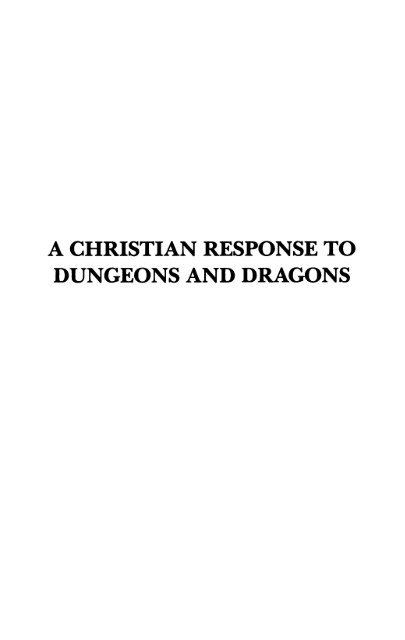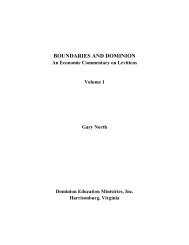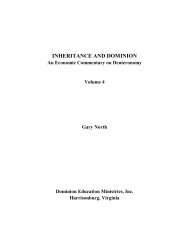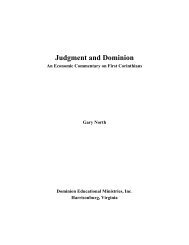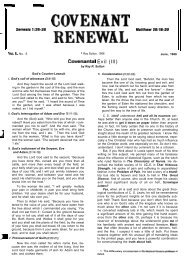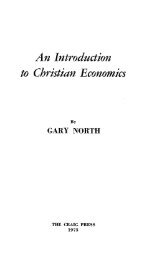a christian response to dungeons and dragons - Gary North
a christian response to dungeons and dragons - Gary North
a christian response to dungeons and dragons - Gary North
Create successful ePaper yourself
Turn your PDF publications into a flip-book with our unique Google optimized e-Paper software.
A CHRISTIAN RESPONSE TODUNGEONS AND DRAGONS
Other books by Peter Leithart:The Reduction ojChristianity, 1987 [with <strong>Gary</strong> DeMar]Other books by George Grant:Bringing in the Sheaves: Transforming Poverty in<strong>to</strong> Productivity, 1985In the Shadow ojPlenty: Biblical Principles ojWelfare <strong>and</strong> Poverty, 1986The Dispossessed: Homelessness in America, 1986The Changing ojthe Guard: Biblical Principles ojPolitical Action, 1987Rebuilding the Walls: A Biblical Strategy <strong>to</strong> Res<strong>to</strong>re America's Greatness, 1987[with Peter Waldron]The Big Lie: The Sc<strong>and</strong>al ojPlanned Parenthood, 1988
A CHRISTIAN RESPONSE TODUNGEONS AND DRAGONSThe Catechism of the New AgePeter Leithart<strong>and</strong>George GrantDominion PressFort Worth, Texas
Dedicated <strong>to</strong> our children:May they ever be able <strong>to</strong> discern the difference.Philippians 1:9-11Special thanks <strong>to</strong> Jim Stewart <strong>and</strong> Robert Saxon, former Dungeon Masters, fortheir evaluation <strong>and</strong> input on this project.Copyright © 1987 by Dominion Press. Second edition, revised March 1988.All rights reserved. Written permission must be secured from the publisher <strong>to</strong> useor reproduce any part of this book, except-for briefquotations in critical reviewsor articles.Published by Dominion Press7112 Burns StreetFort Worth, Texas 76118Printed in the U.S.A.Library ofCongress Catalog Card Number 87-071865ISBN 0-930462-60-2
Parents are concerned.A CHRISTIAN RESPONSE TODUNGEONS AND DRAGONSThe Catechism of the New AgeAnd well we should be. Our children are growing up in a veryhazardous world. Not only are they forced <strong>to</strong> pick their way througha complex maze of conflicting values at school, in the neighborhood,<strong>and</strong> out in the marketplace, but they are even being assaulted in the"safety" oftheir own homes.Across the airwaves has come a barrage of violent, irreverent,fantastic, <strong>and</strong> occultic Saturday morning car<strong>to</strong>ons. Out of the <strong>to</strong>y boxhas come a haunting phalanx ofmagical <strong>and</strong> monstrous macho images!Off the bookshelf has come a frightening parade of pulp <strong>and</strong> pap:comics <strong>and</strong> paperback books that exalt the basest of vices <strong>and</strong> disdainthe highest of virtues. And then, of course, there is MTV: sex, drugs,violence, rebellion, <strong>and</strong> defilement on tap twenty-four hours a day, allat the flick ofa switch <strong>and</strong> the turn ofa dial.The seductive siren's song ofthe world has begun <strong>to</strong> seep in<strong>to</strong> eventhe most protected of environments. And as a result, the hearts <strong>and</strong>minds <strong>and</strong> souls ofour children have become a battleground.Amazingly though, the chief weapon used in this spiritual raid onour children is a game - just a simple little game. It is called Dungeons<strong>and</strong> Dragons. Even more than all the car<strong>to</strong>ons, <strong>to</strong>ys, comics, books,videos, <strong>and</strong> music, this simple little game has served <strong>to</strong> make ourchildren a "generation at risk."What is Dungeons <strong>and</strong> Dragons?It's Christmas morning. Brimming with excitement Junior openshis first gift, a Basic Dungeons <strong>and</strong> Dragons Set. Inside he finds a rulebook, some graph paper, <strong>and</strong> an odd set of dice. No game board. Nolittle "men" <strong>to</strong> move around. He checks the wrapping paper for miss-
2 A Christian Response <strong>to</strong> Dungeons <strong>and</strong> Dragonsing pieces, then begins <strong>to</strong> open the other packages, hoping <strong>to</strong> find "therest" of his game.But, Junior has all he needs <strong>to</strong> play Dungeons <strong>and</strong> Dragons (D&D),the gr<strong>and</strong>daddy of the fantasy role playing games (FRPs) <strong>and</strong> one ofthe fastest selling games in the United States. The game, you see,doesn't take place on a board. Instead, you play in your head. In D&Dthe basic rule is, "Use your imagination. Stretch it <strong>to</strong> the limit." Gameboards <strong>and</strong> little men can be so confining.There are rules, ofcourse. Thous<strong>and</strong>s <strong>and</strong> thous<strong>and</strong>s of them. Butthe whole point of an FRP is <strong>to</strong> play a character whose actions aredictated by your imagination, not by the rules. Like drama without ascript, D&D is so complicated that we can give only the barestdescription of how the game is played. Before the game begins, eachplayer must define his character. A roll of the dice determines thecharacter's basic personality. Seven areas are rated: strength, intelligence,wisdom, dexterity, constitution, comeliness <strong>and</strong> charisma. Anotherroll of the dice decides each character's age, diseases, parasiticinfestations, <strong>and</strong> special skills.Next, the player selects his character's race <strong>and</strong> class. If he wants<strong>to</strong> be a non-human, there are several races <strong>to</strong> choose from: dwarf, elf,gnome, half-elf, halfling, half-ore. Each race, in turn, is divided in<strong>to</strong>several classes such as clerics, fighters, magic-users, <strong>and</strong> thieves. Aplayer chooses his character's class according <strong>to</strong> the character's strengths.A character with high strength rating <strong>and</strong> low intelligence might be aFighter. An intelligent character would be a good Magic-User orCleric.Then, the player rolls the dice <strong>to</strong> determine "hit points," thedamage his character can suffer without dying. The higher the roll, thebetter his chance ofsurviving a melee.Each character is given a certain amount ofgold <strong>to</strong> buy equipmentfor his adventure. Different sorts ofcharacters use different equipment.A Cleric purchases holy water, a Fighter needs heavy weapons, a Thiefcan obtain a prepackaged set of thievery <strong>to</strong>ols.Finally, the players choose their character's "alignment" fromthree basic possibilities: Law, Chaos, <strong>and</strong> Neutral. Lawful charactersvalue order, organization, <strong>and</strong> the group, while those aligned withchaos value freedom, spontaneity, <strong>and</strong> the individual. Each alignmentincludes good <strong>and</strong> evil characters. The good characters operate interms of "creature rights," while evil characters have no regard for
The Catechism ofthe New Age 3their fellows. A character's alignment might be chaotic good, chaoticevil, lawful good, lawful evil, neutral evil, etc.The Dungeon Master (DM) is the most important "player," thoughhe doesn't really play the game at all. The DM is an experiencedplayer who draws up the "game board," a complex dungeon map thatis different in every game. He populates the dungeon with monstersselected from the rule book. Only the DM sees the map at the beginningof the game. He directs the players through the maze, telling them'when they meet a monster, what kind of 'monster it is, <strong>and</strong> theirchances of killing it. The outcome of a battle is determined by a diceroll. The players draw maps as they go. They enter the dungeon <strong>and</strong>battle the monsters, seeking treasure <strong>and</strong> trying <strong>to</strong> survive.Unlike conventional games, there is no real end <strong>to</strong> D&D. A typicalsession can last 4-12 hours. Games can continue for years if the playersare skillful enough <strong>to</strong> survive battles. As they conquer various monsters,in fact, they gain experience points <strong>and</strong> become more powerful<strong>and</strong> better equipped for battle. There aren't winners <strong>and</strong> losers in anyconventional sense; only a series of adventures that finally come <strong>to</strong> anend when a character dies.The Genesis ofthe GameDungeons <strong>and</strong> Dragons was invented by <strong>Gary</strong> Gygax, an enthusias<strong>to</strong>f his<strong>to</strong>rical war games that gained a cult following in the '50s <strong>and</strong>'60s. Gygax combined the war game idea with medieval imagery <strong>and</strong>magic <strong>to</strong> make D&D. Spurned by the major game companies, Gygaxinvested $1000 <strong>to</strong> form TSR Hobbies in 1973 <strong>to</strong> market his newcreation. Brian Blume invested $2000 more in 1974, <strong>and</strong> the two beganprinting rule books.At first sales were slow; the first 1000 games <strong>to</strong>ok a year <strong>to</strong> sell.The game gained in popularity during the following year, especiallyamong college students. In 1975 TSR was incorporated, <strong>and</strong> Gygax<strong>and</strong> Blume began working fulltime. They published revised <strong>and</strong> advancedrule books <strong>and</strong> began <strong>to</strong> produce other FRPs. By 1977 saleswere up <strong>to</strong> $564,000 <strong>and</strong> nearly a dozen employees had been added <strong>to</strong>the payroll.It was not until 1979 that D&D gained nationwide attention. Inthat year, Michigan State University student James Dallas Egbert, a16-year-old mathematics genius, disappeared, apparently while playinga realistic form of D&D, in the maze of steam tunnels underneaththe University's campus. Egbert was found, but committed suicide a
4 A Christian Response <strong>to</strong> Dungeons <strong>and</strong> Dragonsyear later. His disappearance, <strong>and</strong> his obsession with D&D along withit, became front-page news in many major periodicals. Though mostmedia assessments of the game were negative, the publicity paid hugedividends. Dana Lombardy, a columnist for Model Retailer, says thatTSR "should raise a foundatIon <strong>to</strong> this Egbert kid. Except for thedisappearance of that boy <strong>and</strong> the resulting national exposure, TSRcould have remained a steadily growing hobby-game company insteadof a sky-rocketing one." Gygax agrees: "Ultimately, it was immeasurablyhelpful <strong>to</strong> us in name recognition. We ran out ofs<strong>to</strong>ck!"The numbers confirm this assessment. Sales exploded from $2.3million in 1979 <strong>to</strong> $8.7 million in 1980. Since 1980, sales have nearlydoubled every year: 1981 sales were $14 million; 1982 exceeded $22million. By 1985 TSR was racking in more than $100 million in sales!As the company grew, it began hitting a new market. Originally, theprimary market was college students. By 1980, 46 percent of the saleswere <strong>to</strong> the 10-14 age group, <strong>and</strong> another 26 percent <strong>to</strong> ages 15-17.The game continues <strong>to</strong> be popular, however, among older students,even at Christian colleges <strong>and</strong> seminaries.Meanwhile, TSR also diversified in several directions. An electronicversion is now available, <strong>and</strong> D&D is coming out in French <strong>and</strong>German editions. New FRPs were created, with names like Warlocks<strong>and</strong> Warriors, Knights ofCamelot, Top Secret, Boot Hill, <strong>and</strong> Gamma World.TSR publishes a monthly magazine, The Dragon, <strong>and</strong> the Endless Questbook series, the first four ofwhich ranked in the <strong>to</strong>p five amongjuvenilebest sellers. A movie, Dungeonmaster, appeared a few years back. Anda number of Saturday morning car<strong>to</strong>ons have been developed for bothnetwork <strong>and</strong> cable broadcasting.While TSR is by far the largest company producing FRPs, accountingfor nearly half the <strong>to</strong>tal industry sales, they are not without(often fierce) competition. There are about 400 FRPs now on themarket. Most games continue the "medieval sorcery" motif that dominatesD&D. The competi<strong>to</strong>rs include Tunnels <strong>and</strong> Trolls, Chivalry <strong>and</strong>Sorcery, RuneQuest, <strong>and</strong> Arduin Grimoire. In all, it has been estimatedthat 250,000-300,000 FRPs have been sold.The motifs ofFRPs are reinforced by all the other aspects ofyouthculture. Saturday morning car<strong>to</strong>ons feature the Masters ofthe Universe,muscle-bound barbarians living in a world of magicians, witches, <strong>and</strong>sorcerers. You can get Masters ofthe Universe dolls, balls, comic books,<strong>and</strong> videos. There's even a feminist version: She-Ra, Princess of Power.And then there are the Smurfi <strong>and</strong> the Care Bears: cute <strong>and</strong> cuddly butborn out of the same mentality.
The Catechism ofthe New Age 5Since 1980, D&D <strong>and</strong> its imita<strong>to</strong>rs have entered the mainstreamof American life. Public schools use D&D <strong>to</strong> teach reading <strong>and</strong> mathskills. Highly intelligent students are particularly attracted by thecomplexity <strong>and</strong> excitement, <strong>and</strong> D&D is often used in classes of "giftedchildren." In Herber City, Utah, parental objections <strong>to</strong> D&D in thepublic school pressured the school board <strong>to</strong> discontinue its use. A BoyScout post in Chattanooga uses D&D, <strong>and</strong> the game has been advertisedin Boys Life, the official Scout magazine. Some Catholic schoolsare using D&D. Public libraries open their doors for training <strong>and</strong>game sessions.The Moral DilemmaSo, why all the fuss? D&D sounds like a challenging <strong>and</strong> excitingnew way <strong>to</strong> spend an evening. It must be educational; otherwise theywouldn't use it in public schools, right? Even the Boy Scouts use it. Inthe face of all this support, it seems almost un-American <strong>to</strong> suggestthere are serious deficiencies with the game.But there are serious defects. Very serious. In spite ofthe favorablefinancial results of the Egbert case, the eerie course of events cast ashadow over the entire industry. Remember the "Freeway Killer"Vernon Butts, who committed suicide in his jail cell in 1981 whilebeing held as a suspect in a string ofmurders? Butts was an avid D&Dplayer, who often communicated with visi<strong>to</strong>rs using a code developedas a part of his D&D involvement. Another isolated incident? Nothardly. Police reports around the country have connected FRP activity<strong>to</strong> more than a hundred suicide <strong>and</strong> murder cases.Of course, not everyone who plays the game becomes suicidal orhomicidal. Still, there are an awful lot of unsettling things going onhere. One of the chief defenses of FRPs is that they stimulate the.imagination. This is undeniably true. The question is whether wewant our imagination (or that of our children) stimulated in thisparticular way. Consider, for example, the level of violence <strong>and</strong> crimein a typical D&D game. One psychologist wrote, "There is hardly agame in which the players do not indulge in murder, arson, <strong>to</strong>rture,rape, or highway robbery." And he likes the game! The Dungeon Master'sGuide lists Hitler among those his<strong>to</strong>rical characters who exhibitedtrue D&D charisma.It gets worse, because the violence in D&D is generally lessgraphic than in some of its imita<strong>to</strong>rs. Consider these characters fromThe Monster Manual:
6 A Christian Response <strong>to</strong> Dungeons <strong>and</strong> DragonsHarpy: The Harpys attack, <strong>to</strong>rture, <strong>and</strong> devour their charmedprey. What they do not want they foul with excrement.Lizard Man: They are omnivorous, but lizard men are likely<strong>to</strong> prefer human flesh <strong>to</strong> other foods. In this regard they have beenknown <strong>to</strong> ambush humans, gather up the corpses <strong>and</strong> survivorsas captives, <strong>and</strong> take the lot back <strong>to</strong> their lair for a rude <strong>and</strong> horridfeast.Or, consider this selection from the "Critical Hit Table" of the rulebook for Arduin Grimoire:• Dice roll: 37-38; hit location: crotch/chest; results: genitals/breast <strong>to</strong>rn off; shock.• Dice roll:95; hit location: guts ripped out; results: 20 percentchance oftangling feet, die in 1-10 minutes.• Dice roll: 100; hit location: head; results: head pulped <strong>and</strong>splattered over a wide area.As one 18-year-old player put it, these are games "where you get<strong>to</strong> kill people <strong>and</strong> get away with it."Much of the violence is sexually oriented. The cover of the EldrichWizardry supplement <strong>to</strong> the D&D rule book pictures a nude womanlying across a sacrificial altar, an image with both sexual <strong>and</strong> occulticover<strong>to</strong>nes. Sado-masochism is listed among the insanities that a charactermight suffer. Non-violent sexual references also abound. Malecharacters often attempt <strong>to</strong> seduce female characters. One of the"minor malevolent effects" is satyriasis, defined as "excessive or abnormalsexual craving in the male." Herbal remedies for venereal diseasesare provided in the rule book.Those who profit from the games are quick <strong>to</strong> defend the emphasison sex, violence, <strong>and</strong> sexual violence. Dave Hargrave, crea<strong>to</strong>r ofArduinGrimoire, says of his game:It's deliberately gruesome. You have <strong>to</strong> blow a hole throughthat video shell the kids are encased in. They are little zombies.They don't know what pain is. They have never seen a friendtaken out in a body bag. They've got <strong>to</strong> underst<strong>and</strong> that what theydo has consequences. The world is sex. The world is violence. It'sgoing <strong>to</strong> destroy most of these kids when they leave TV-l<strong>and</strong>.An article in The Dragon made the same defense ofD&D ethics:Being evil <strong>and</strong> <strong>to</strong>ugh seems <strong>to</strong> have a lot of machismo <strong>and</strong> c<strong>and</strong>raw quite a bit of respect for you in the game. . . .
The Catechism ofthe New AgeBesides, what we're doing is the way of the universe. Only thestrong survive. Nice guys finish last. I'm number one. Mightmakes right.7Quite explicably, the name of the game is power. Of all thecharacters, the Dungeon Master is clearly the most powerful. D&Denthusiasts have no hesitation in saying that the Dungeon Master is"God." But the other characters are equally motivated by lust forpower. Power can be exercised by brute force or through magicalspells. For some players, this motivation is transferred <strong>to</strong> real-liferelationships. One young player admits that playing D&D encouragedhim <strong>to</strong> be deceptive <strong>and</strong> manipulative at home <strong>and</strong> in school. He wouldpurposely get in<strong>to</strong> trouble just for the sake of testing his survival skillsin a real-life crisis. He was especially attracted <strong>to</strong> Merlin, the magicianof King Arthur's court.I thought it would be great <strong>to</strong> have Merlin's spirit inside ofme;then I could do what he used <strong>to</strong> do. I tried <strong>to</strong> get deeper <strong>and</strong>deeper by playing D&D, playing the Ouija Board, reading horoscopes<strong>and</strong> even having my palm read. I really got in<strong>to</strong> it a lot,<strong>and</strong> I would think inside of me that I wasn't scared of anything- I had power, <strong>to</strong>o. I believed that I was <strong>to</strong>o <strong>to</strong>ugh <strong>to</strong> behurt - nothing could hurt me. I did things like jumping on aDoberman Pinscher that was chasing me <strong>and</strong> some guys, <strong>and</strong>walking off a ledge just <strong>to</strong> prove the power I had.A frustrated writer admitted that he experienced "an incrediblesense of power" as a Dungeon Master: "In some games, they don'tcall me Dungeon Master; they call me God."Fantasy power is a strong attraction <strong>to</strong> many people who feelpowerless in the real world. For such people, D&D becomes an escapefrom a drab <strong>and</strong> burdensome life. Advertisements for D&D play onthis aspect: "I don't have <strong>to</strong> just hang around. I can play Dungeons <strong>and</strong>Dragons." The degree ofescape varies. Some can leave the game behindthem when a session is over. For others, D&D replaces life. They talkabout nothing but their dungeon experiences. What began as a gamebecomes a life-dominating obsession. Such was the case with "John,"a 16-year-old living in Southern Califorrtia:I am the Dungeon Master 98 percent of the time. I am the Godof my world, the crea<strong>to</strong>r who manipulates the gods <strong>and</strong> humans.But my bossiness has extended itself in<strong>to</strong> real life. I've exploited<strong>and</strong> abused people. People have hated me for it.... Ever since Iwas ten, I've wanted <strong>to</strong> drop out of this world. There are so many
8 A Christian Response <strong>to</strong> Dungeons <strong>and</strong> Dragonsflaws. A lot of things are unfair. When I am in my world, I controlmy own world order. I can picture it all. The groves <strong>and</strong> trees.The beauty. I can hear the wind. The world isn't like that....It's hazardous.... The more time you spend in your fantasyworld, the more you want <strong>to</strong> walk away from the burdensomedecisions in life.... The more I play D&D, the more I want <strong>to</strong>get away from this world.No doubt, D&D did not create John's disillusionment, but itprovided an outlet for the full expression of his au<strong>to</strong>nomy <strong>and</strong> rebellion.In a very dramatic way, D&D reinforced John's hatred for lifeas ordered <strong>and</strong> given by God.Obsessive escapism of this sort is virtually equivalent <strong>to</strong> schizophrenia.One psychologist warned that adolescents may become emotionally<strong>and</strong> mentally disturbed by obsessive participation in FRPs."The greatest danger I see is the escape from reality. These kids taketheir own unacceptable impulses <strong>and</strong> put them in<strong>to</strong> fantasy. Schizophreniais a thought disorder <strong>and</strong> D&D confuses the way people think.Thoughts not based on reality are dangerous." One enthusiastic playeradmitted that D&D had made him a virtual schizophrenic. He saidhe would probably cry if the character he has been directing for threeyears were <strong>to</strong> die.To this point, D&D might appear <strong>to</strong> be only a more graphic formof earlier war games. But the method of warfare in D&D is entirelydifferent. Magic, witchcraft, casting spells - these are the most desirable<strong>and</strong> powerful weapons in FRPs. In fact, it is the occultic elementthat makes FRPs what they are; without them, they would be grotesquebut essentially run-of-the-mill war games. It is the occulticelement that gives players of D&D <strong>and</strong> its imita<strong>to</strong>rs the sense ofawesome power. It is the occultic element that leads <strong>to</strong> a manipulativeattitude. And it is the occultic element that makes the game so verydangerous. Magic <strong>and</strong> witchcraft are found on nearly every page ofan FRP rule book. The list of characters from which a player choosesincludes magic users, druids, illusionists, <strong>and</strong> clerics. There are twomajor types of spells described: magical <strong>and</strong> clerical. The characterswith magical powers are the most powerful players in the game; theother characters rely on physical strength <strong>and</strong> savagery. The DungeonMaster's Guide includes several pages of instruction on acquiring <strong>and</strong>casting spells. There are directions for chanting, the use of familiarspirits, speaking with the dead, uses of occultic symbols <strong>to</strong> protect thespell caster, <strong>and</strong> definitions of special spells used by shamans <strong>and</strong>witchdoc<strong>to</strong>rs. Spells are given for healing, exorcism, charming other
The Catechism ofthe New Age 9characters, magical flight, fireballs, divination, <strong>and</strong> even res<strong>to</strong>ring thedead.Many ofthe spells, incantations, symbols, <strong>and</strong> protective measuresare genuine occultic techniques. Several spells, for example, instructthe player <strong>to</strong> draw a protective circle when communicating with demons,a practice used by real witches. Spells often require humanbloo~ or flesh. The spell for a Cacodemon (Conjuration) suggests that"By tribute of fresh human blood <strong>and</strong> the promise of one or morehuman sacrifices, the summoner can bargain with the demon forwilling service." Another spell, smacking of Biblical references, givesinstructions for changing sticks in<strong>to</strong> snakes <strong>and</strong> back again.The Dungeon Master also has a wide variety of monsters <strong>and</strong>demons <strong>to</strong> populate his dungeon. Many of these are drawn fromSatanism. One monster, the Mane, is described as a sub-demon whohas gone <strong>to</strong> the "666 layers of the demonic abyss." The most evil ofthem "are confined in tiers of flames of Gehenna." Baalzebub is listedas an archdemon. There are hell hounds, able <strong>to</strong> "breathe out ascorching fire on an opponent up <strong>to</strong> a one inch distance." The Rakshasais described as an "evil spirit encased in flesh" who enjoys a diet ofhuman flesh <strong>and</strong> has the powers of ESP <strong>and</strong> illusion. At the very least,anyone familiar with FRP rule books is learning the terminology ofwitchcraft <strong>and</strong> Satanism. More likely, a seed is sown <strong>and</strong> he is almostimperceptibly drawn in<strong>to</strong> the occult.Of course, the crea<strong>to</strong>rs of fRPs deny that they are promotingwitchcraft. Most claim that they don't believe in the stuffanyway. Andbesides, they insist, the characters in the game are fighting against thesedemons. Even some Christians have defended the game because of itsrealistic depiction of evil. But, remember that it's not just the monsters whoho:oe Satanic puwers. The heroes, the "good guys" also use magic <strong>and</strong> witchcraft<strong>and</strong> learn genuine spells <strong>and</strong> occult techniques. Regardless of the intentionsofthe crea<strong>to</strong>rs ofFRPs, Dr. <strong>Gary</strong> <strong>North</strong>'s summary is still accurate:Without any doubt in my mind, after years of study in thehis<strong>to</strong>ry of occultism, after having researched a book on the <strong>to</strong>pic,<strong>and</strong> after having consulted with scholars in the field of his<strong>to</strong>ricalresearch, I can say with confidence: these games are the mosteffective, most magnificently packaged, most profitably marketed,most thoroughly researched introduction <strong>to</strong> the occult in man'srecorded his<strong>to</strong>ry. Period.According <strong>to</strong> the dictionary, a catechism is "a program ofinstructioncontaining a summary of the principles or an introduction <strong>to</strong> the
10 A Christian Response <strong>to</strong> Dungeons <strong>and</strong> Dragonsfundamentals of a subject." Through the ages Christians have usedcatechisms <strong>to</strong> teach the ABCs of the faith <strong>to</strong> their children. By repetition<strong>and</strong> recitation the catechisms enabled them <strong>to</strong> rehearse Biblicalbasics in a fun, easy-<strong>to</strong>-Iearnfashion.In an· ominously parallel way, D&D has become a modern-daycatechism. The game contains a summary of the principles <strong>and</strong> anintroduction <strong>to</strong> the fundamentals of the occult. By repetition <strong>and</strong>recitation, D&D enables children <strong>to</strong> rehearse occultic basics in a fun,easy-<strong>to</strong>-Iearn fashion. Thus, D&D really is a catechism ofoccultism.Instead of raising up a generation nurtured <strong>and</strong> admonished bythe things of God, we're systematically weaning our children on theoccult.The Christian ResponseHow should a Christian respond <strong>to</strong> such games? For several reasons, wethink they should be simply off limits <strong>to</strong> Christians. First, virtually allFRPs present a general world-view that is antithetical <strong>to</strong> Christianity,pure <strong>and</strong> simple. The games treat magic, witchcraft, <strong>and</strong> Satan as purefantasy, while the Bible views these as awful realities. An avid playerbegins <strong>to</strong> treat these realities as fairy tales. We must put it even morestrongly than this. Not only are gods, devils, <strong>and</strong> demons treated asfantasy, Jesus Himself is included as one of the deities. Note carefullythe logic here: "It's just a game. The monsters aren't real. The magicalpowers aren't real. The gods aren't real. Jesus is one of the gods."Christ is reduced <strong>to</strong> the level of fantastic monsters, halflings, dwarves,<strong>and</strong> elves. We can give this no less a label than blasphemy.Second, most FRPs takes place in a thoroughly Manichaean universewhere law <strong>and</strong> chaos are equally powerful <strong>and</strong>, in a strangesense, equally "good." Characters can choose <strong>to</strong> align themselves withlaw or chaos, <strong>and</strong> each of these alignments can be good, evil, orneutral. There are good <strong>and</strong> evil deities. The spells suggest the use of"holy/unholy water." In such a universe, magic can be either whiteor black, good or evil. And it doesn't much matter which. Obsessiveplayers who become deeply attached <strong>to</strong> their characters are trainingthemselves <strong>to</strong> view reality in the same way.Third, Scripture expressly forbids tampering with magic <strong>and</strong> witchcraft,divination, human sacrifice, <strong>and</strong> many of the other commonelements of most FRPs (cf. Ex. 22:18; Deut. 19:9-14; Lev. 18:21; 19:26;31). Saul was severely rebuked for practicing witchcraft (1 Samuel 15;28). Witchcraft <strong>and</strong> divination are attempts <strong>to</strong> gain wisdom, favor, <strong>and</strong>
The Catechism ofthe New Age 11power apart from God's ordained means, <strong>and</strong> thus involve a thoroughrejection of God's authority. Witchcraft is associatGd in the Scripturewith rebellion, idolatry, <strong>and</strong> adultery.In defending FRPs, many people have pointed out the obvious factthat most fairy tales (The Brothers Grimm, j.R.R. Tolkien, or C.S.Lewis for example) are full of witches, goblins, <strong>and</strong> sorcerers.But the heroes of these s<strong>to</strong>ries aren't the witches <strong>and</strong> sorcerers.Only the evil witch can change the prince in<strong>to</strong> a frog. The princehimself uses entirely mortal means. Sorcery is always a temptation infairy tales. As Lewis' <strong>and</strong> Tolkien's men<strong>to</strong>r, G .K. Chester<strong>to</strong>n, pointedout, the genius of fairy tales lies in the fact that the hero is a normalperson in an abnormal world, an innocent among ravaging netherbeasts. Make the hero abnormal <strong>and</strong> you destroy the tension <strong>and</strong>interest (not <strong>to</strong> mention the moral focus) of the entire narrative.There's all the difference in the world between Hansel <strong>and</strong> a dwarfcleric who casts spells. Both may meet a witch, but they react differently.The dwarf covets the witch's power; Hansel just wants a chance<strong>to</strong> shove her in<strong>to</strong> the oven.How Should We Then Play?We know, we know. This whole thing is just another way thatChristians have found <strong>to</strong> spoil everyone's fun. We can't sleep at nightif we know someone is having a good time. Because this caricature ofChristianity is so commonplace, it is necessary for us <strong>to</strong> present theoutlines of a Biblical approach <strong>to</strong> play in general <strong>and</strong> role-playing inparticular.Leisure is one of the chief blessings of God's covenant mercy. Goddelivers His people that they may rest. This is a central theme ofExodus.The book begins with Israel in slavery. Moses appears before Pharaoh<strong>to</strong> dem<strong>and</strong> that the Israelites be permitted <strong>to</strong> celebrate a festal sacrifice(5:3). Instead, Pharaoh charges the Israelites with laziness <strong>and</strong> increasestheir burden (5:6-9, 17-18). After the Exodus, Israel observesa weekly Sabbath (16:23). Thus, in the recitation ofthe law in Deuteronomy,the Sabbath is a reminder of Israel's slavery (Deut. 5:15).Israel cannot deny rest <strong>to</strong> aliens because <strong>to</strong> do so would be <strong>to</strong> imitatePharaoh <strong>and</strong>, as it were, <strong>to</strong> turn back the clock on redemptive his<strong>to</strong>ry.It is for this reason that the Sabbath takes on such central importancein later Israelite his<strong>to</strong>ry. To neglect the Sabbath is <strong>to</strong> revert <strong>to</strong> abondage where rest <strong>and</strong> leisure are denied. The Sabbath, of course, iscentrally a religious rest <strong>and</strong> a time of worship. The point here is
12 A Christian Response <strong>to</strong> Dungeons <strong>and</strong> Dragonssimply that leisure, "time out" from work, is an important <strong>and</strong> Godordainedpart ofthe life ofGod's people.By pushing this theme back <strong>to</strong> the beginning of Biblical his<strong>to</strong>ry,we come <strong>to</strong> a fuller underst<strong>and</strong>ing of the nature of the Sabbath rest.While Deuteronomy roots the Sabbath in the Exodus, the book of4<strong>to</strong>dus(Ex. 20:4), roots it in creation: Israel is comm<strong>and</strong>ed <strong>to</strong> keep theSabbath because the Lord Himself rested on the seventh day of creationweek (Ex. 20.4). Thus, the leisure of God's people is <strong>to</strong> image the"leisure" of God. Significantly, God's rest follows His evaluation ofcreation as "very good" (Gen. 1:31). From this we can infer that God'sseventh-day rest was not a mere cessation from labor, but a positiveenjoyment of the "very good" things He had made. This is confirmedby Proverbs (Prov. 8:30-31), where God's Wisdom is pictured as acraftsman delighting in the world He has made, <strong>and</strong> especially in man(Prov. 8:30-31). Man's rest, in imitation of God, is <strong>to</strong> include thisaspect of enjoyment of creation. Again, this is emphasized in Genesis(Gen. 2:9), where we are <strong>to</strong>ld that the trees were "pleasing <strong>to</strong> the eye<strong>and</strong> good for food (Gen. 2:9)." Man was made not only <strong>to</strong> rulecreation, but also <strong>to</strong> enjoy God's bounty in it (Eccles. 2:24-26; 3: 12-14;5: 18-20). Indeed, the Bible considers it a curse for a man <strong>to</strong> workwithout being able <strong>to</strong> enjoy the fruits of his labor (cr. Deut. 28:30; Is.65:22). Freed from the crushing burden of guilt <strong>and</strong> sin, the believeris able fully <strong>to</strong> enjoy God's world.Partying, laughter, <strong>and</strong> play are also included in the Biblicalunderst<strong>and</strong>ing of leisure. After the Exodus, Moses <strong>and</strong> Miriam ledIsrael in singing <strong>and</strong> dancing; David danced on the return of the ark<strong>to</strong> Jerusalem; Jeremiah compared Israel's return from exile <strong>to</strong> a virgindancing <strong>and</strong> playing a tambourine <strong>and</strong> <strong>to</strong> a lavish banquet Ger. 31:4,10-14). These are all "religious" celebrations that nonetheless involvewhat older translations call "merrymaking." "Non-religious" play isalso presented in Scripture as a blessing. The prophets, for example,predicted that in the Messianic age, ~hildren would play in the streets<strong>and</strong> at the nest ofvipers (Zech. 8:5; Is. 11:7). The sight <strong>and</strong> sound ofchildren safely playing in the streets is a sign ofa well-ordered city.But of course, our leisure must be subject <strong>to</strong> God's Law. Play isgood, but the "play'" of the Israelites at Sinai brought God's curseupon them (Ex. 32:6). Laughter is God's gift, but the laughter ofSaraharose from unbelief (Gen. 18:12f1). Parties are good, but the merrimen<strong>to</strong>f the rich man was foolish (Lk. 12: 13-21). Moreover, leisure is never<strong>to</strong> dominate our lives; there is a time for everything under the sun. Themodern idea that one works in order <strong>to</strong> have the wherewithal <strong>to</strong> play
The Catechism ofthe New Age 13is not Biblical. The Preacher of Ecclesiastes says that we should enjoyour leisure <strong>and</strong> our work. He summarizes in this way: "Whatever yourh<strong>and</strong> finds <strong>to</strong> do, do it with all your might" (Eccles. 9:10): Play, whilegood in itself, can never become an escape from responsibility.What does the Bible say specifically about role-playing? Scriptureseems <strong>to</strong> assume that role-playing, or imitation, is inescapable. We allimitate someone or something. Indeed, it is bound up in man's verybeing <strong>to</strong> be an imita<strong>to</strong>r. We are first of all <strong>to</strong> imitate our Crea<strong>to</strong>r. ButScripture counsels us not only <strong>to</strong> imitate God, but <strong>to</strong> imitate those whoare godly. Paul often tells his readers <strong>to</strong> imitate him (eg., 1 Cor. 4:16;11:1; Phil. 3:17; etc.). The writer of Hebrews tells us <strong>to</strong> imitate thefaithful men <strong>and</strong> women of the Old Testament, as well as the leadersof the Church (Heb. 6: 12; 13:7). God even tells us <strong>to</strong> imitate animals.The lazy are counselled <strong>to</strong> imitate the ant (Pr. 6:6fl). And, we mightsuggest that the workaholic learn <strong>to</strong> imitate leviathan (Ps. 104:26).This emphasis on imitation is confirmed by the Biblical underst<strong>and</strong>ingof teaching <strong>and</strong> learning. Teaching <strong>and</strong> learning are notpurely intellectual categories. When the Lord "taught warfare" <strong>to</strong> theIsraelites Uudg. 3:2), He did not conduct a seminar in military strategy.He taught warfare by leaving foreign powers in the l<strong>and</strong> for Israel<strong>to</strong> fight. Israel learned war by fighting. Teaching <strong>and</strong> learning inScripture include intellectual <strong>and</strong> verbal instruction, but also includeimitation or "role-playing," drill, practice, discipline, <strong>and</strong> the pedagogyofritual.Thus, there seems <strong>to</strong> be every Scriptural reason for teaching through"role-playing" or "pretending." The value of this kind of training isseen most obviously in children. Our daughters learn something aboutmotherhood by playing with their dolls. Our sons begin <strong>to</strong> learncourage by pretending <strong>to</strong> fight. This role-playing will pay dividendsin later life. It's said that Abe Lincoln learned <strong>to</strong> speak by st<strong>and</strong>ingon a stump <strong>and</strong> delivering orations <strong>to</strong> a pile ofsplit rails.There is also room for non-didactic role-playing, that is, for roleplaying"just for fun." The lovers in the Song of Songs appear <strong>to</strong> beengaging in playful role-playing. In the Feast of Tabernacles, theIsraelites lived in "booths" for a week. The primary purpose wasdidactic, <strong>to</strong> remind Israel of their deliverance from slavery in<strong>to</strong> theabundance of the l<strong>and</strong>. But it is hard <strong>to</strong> resist the suspicion that the"role-play" also contributed <strong>to</strong> the festive atmosphere. In any case, acertain level of identification with a role is basic <strong>to</strong> playing games <strong>and</strong>enjoying fiction <strong>and</strong> drama.
14 A Christian Response <strong>to</strong> Dungeons <strong>and</strong> DragonsThere are, however, limits <strong>to</strong> our role-playing. The most obviousis that we are not <strong>to</strong> imitate those who are rebels against God. Roleplayis a powerful means of teaching new behavior. To play the roleof a rebel is <strong>to</strong> learn rebellion. Thus, the Lord comm<strong>and</strong>ed Israel not<strong>to</strong> imitate the nations (Deut. 18:9; lit., "You shall not learn <strong>to</strong> doaccording <strong>to</strong> the abominations of the nations"). This passage is especiallysignificant for our purposes, because Israel is specifically forbidden<strong>to</strong> imitate the foreign nations in human sacrifice, witchcraft, <strong>and</strong>divination.The second limitation on role-playing is that the role can neverbecome an identification. This was Adam's sin. He was created <strong>to</strong>imitate God, but he wanted <strong>to</strong> be God. We are <strong>to</strong>ld <strong>to</strong> imitate the ant,but <strong>to</strong> become an ant is a Kafkaesque nightmare. It is always dangerous<strong>to</strong> become so attached <strong>to</strong> a role model that one cannot separatehimself from that role. In some cases, the danger can be explicit, likethe child who jumps out ofa window thinking he's Superman. In othercases, the danger is more subtle; a confusion ofidentity can take place.Sometimes, the identification is relatively innocuous, such as when aplayer begins <strong>to</strong> take a game <strong>to</strong>o seriously. Ultimately, all extremeidentification with a role is sin, because it involves a rebellious rejectionof the role <strong>to</strong> which God has assigned us. This motive is apparentin many of the D&D enthusiasts quoted above. They hate their Godgivenrole in the God-directed drama of his<strong>to</strong>ry, <strong>and</strong> they play D&Din order <strong>to</strong> create their own identity <strong>and</strong> their own his<strong>to</strong>ry.The issue, then, is not role-playing or no role-playing, but whichroles <strong>and</strong> how intensely involved do we become. There is no good reason<strong>to</strong> play characters who regularly practice what God condemns. Thepower of role-play is such that we take on some of the character of theroles we play. Role-playing has sometimes been used as a brainwashingtechnique <strong>and</strong> is regularly used by psychologists <strong>and</strong> humanisticeduca<strong>to</strong>rs as a way <strong>to</strong> teach new behavior. These effects could bepositive, if only the roles they thrust upon their subjects were positive.After all, some behavior needs <strong>to</strong> be changed, <strong>and</strong> role-play could be ahelpful way <strong>to</strong> learn better habits. But if the roles involve the use ofpop-psychology, New Age educational manipulation, witchcraft, deception,<strong>and</strong> gratui<strong>to</strong>us violence, the habits learned are bound <strong>to</strong> be badones.The short of it is that any activity that is not submitted <strong>to</strong> the ruleofGod's Law is bound <strong>to</strong> turn ugly <strong>and</strong> dangerous. On the other h<strong>and</strong>,any activity that is submitted <strong>to</strong> the rule of God's Law is bound <strong>to</strong>strengthen <strong>and</strong> edify.
The Catechism ofthe New Age 15So, what do we say <strong>to</strong> children who play with <strong>to</strong>y guns <strong>and</strong> plasticsoldiers? Is not this a role-playing activity that can, lead <strong>to</strong> violentbehavior? It certainly can, tf the child takes his play role so seriouslythat he begins <strong>to</strong> bully children in, say, Sunday school class. But waris, Biblically speaking, a legitimate, though undesirable, use of violence.By learning <strong>to</strong> play war, a child is not necessarily learning <strong>to</strong>do anything that God forbids. Indeed, such play can be helpful <strong>to</strong>instill in a child the reality of the Christian's life-long warfare againstSatan <strong>and</strong> sin.Or what about playing evil characters in drama? Maya Christianlegitimately play Iago? Mephis<strong>to</strong>pheles? Ted Bundy? Charles Manson?Clearly, the character's place in the entire context of the work isthe decisive fac<strong>to</strong>r. If a play celebrates the perversion of its character,there can be little justification for a Christian playing the role. And,there is the fac<strong>to</strong>r of identification with the role. Lee J. Cobb was sointensely involved in his portrayal of Willy Loman that he began <strong>to</strong>contemplate suicide. This is clearly a sinful level ofidentification.In summary, Scripture encourages leisure, play, <strong>and</strong> even roleplaying,though always within the limits of the moral Law. In thecontext of these st<strong>and</strong>ards, however, our imaginations find true freedom.Like the sheep <strong>to</strong> which Scripture so often compares us, our freestplay is within the fold. Outside, there is only the bondage of fear thatallows for no real leisure.Practical MattersOkay. So now, what's a parent <strong>to</strong> do? How can we both protec<strong>to</strong>ur children from the evil effects of Dungeons <strong>and</strong> Dragons <strong>and</strong> teachthem a healthy Biblical perspective of play?First, as parents we must make certain that our families begin <strong>to</strong>build a spiritual life <strong>to</strong>gether. Simply going <strong>to</strong> Church on Sundays isnot enough. A family needs <strong>to</strong> pray <strong>to</strong>gether, study the Bible <strong>to</strong>gether,<strong>and</strong> celebrate the seasons <strong>to</strong>gether. Our children need <strong>to</strong> see us modelinga fully orbed comprehensive Christian walk that <strong>to</strong>uches every area oflife. And they must be invited <strong>to</strong> walk that walk with us.Second, as parents we must make certain that our families haveplenty offun <strong>to</strong>gether. By watching us have fun, our children learn how<strong>to</strong> have good, wholesome fun. By watching our friendships in action,they learn how <strong>to</strong> make godly friendships. By watching us play, theysee what righteous recreation is like. And by including our children inour fun, our friendships, <strong>and</strong> our play, we beckon them <strong>to</strong> walk in our
16 A Christian Response <strong>to</strong> Dungeons <strong>and</strong> Dragonsfootsteps. That is the essence of discipleship. And that is the essenceof parenting: teaching by doing.Third, as parents we must explain our rules <strong>to</strong> our children. It is notenough <strong>to</strong> say "no." Our children need <strong>to</strong> know why we've said "no."If we don't want <strong>to</strong> let them watch some of the Saturday morningcaI'<strong>to</strong>ons that "all the other kids" watch, then we ought <strong>to</strong> offer areasonable <strong>and</strong> Scriptural explanation. Perhaps we can even turn theprograms on for a few minutes every once in a while, pointing out theproblems <strong>to</strong> our children <strong>and</strong> providing them with the basic <strong>to</strong>olsthey'll need <strong>to</strong> exercise discernment themselves. Don't just say "no"<strong>to</strong> Dungeons <strong>and</strong> Dragons, or anything else. We must equip our childrenso that th'!Y can say "no" without us having <strong>to</strong> say a thing.Fourth, as parents we need <strong>to</strong> provide the right kind of entertainmentfor our families. Good books should always be available. Andthey should be read. Why not read a chapter of C. S. Lewis' Narniaseries before bed every night? Or maybe G. K. Chester<strong>to</strong>n's FatherBrown series? Or even C. H. Spurgeon's John Plowman series? Whatabout J. R. R. Tolkein, or George McDonald, or Dorothy Sayers, orJohn Bunyan, or William Shakespeare, or John Mil<strong>to</strong>n, or GeoffryChaucer? But don't s<strong>to</strong>p with books. Fill your home with good music,beautiful art, challenging crafts, <strong>and</strong> lovely plants. Every one of us haslimitations - differing gifts, skills, talents, <strong>and</strong> financial resources - butall of us can use what we do have creatively <strong>and</strong> wisely. Paperbacks,cassettes <strong>and</strong> posters are very inexpensive, <strong>and</strong> anyone can transform apile of construction paper, glue, scissors, glitter, <strong>and</strong> crayons in<strong>to</strong> arollicking good time.ConclusionDungeons <strong>and</strong> Dragons is a dangerous game. It serves as an introduction<strong>to</strong> evil, a catechism ofoccultism, a primer for the ABCs ofthe NewAge. It is a recruiting <strong>to</strong>ol of Satan. It can alter the daily behavior ofregular players. It stimulates the seamier side of our imaginations. Itis an enormously attractive <strong>and</strong> effective escape for people frustratedwith life. For many it becomes pure, obsessive fantasy, in its mostdestructive form. It is no longer a game, an imaginative diversion, buta substitute universe in which the player pretends <strong>to</strong> be his own God<strong>and</strong> <strong>to</strong> make his own rules. D&D is not the only problem among youngpeople. The statistics on teenage suicide, however misinterpreted inthe major media, are indicative of widespread dissatisfaction <strong>and</strong>disillusionment among our youth. This is the larger problem that mustbe dealt with. And this problem is often exacerbated by D&D.
The Catechism ofthe New Age 17Games reflect, as well as reinforce, the faith-consensus ofa culture.As such, D&D is the perfect game for the New Age '80s, providing theself-indulgent escapism of drugs without the harmful physical effects.You can get a kind ofhallucinogenic high <strong>and</strong> still make it <strong>to</strong> the healthclub for your workout. Taking a wider view, we might say that FRPstake modernity <strong>to</strong> its logical conclusion. Since Descartes, modern manhas retreated from the bright light of God's creation in<strong>to</strong> the darkworld of his own mind <strong>and</strong> imagination. Though his world is a dungeonpopulated by <strong>dragons</strong>, demons, <strong>and</strong> monsters, he says withMil<strong>to</strong>n's Satan, "Better <strong>to</strong> rule in hell than <strong>to</strong> serve in heaven"!Thankfully, as parents we can provide our children with wholesomealternatives. We can protect them from the strangely magneticallure of the dungeon. We can win the war for their hearts <strong>and</strong> minds<strong>and</strong> souls.Ifonly we would.
18 A Christian Response <strong>to</strong> Dungeons <strong>and</strong> DragonsFOR FURTHER READINGAl Ballard, Answers <strong>to</strong> Common Questions About Dungeons <strong>and</strong> Dragons (LosAngeles, CA: Christian Life Ministries, 1981),9 pages.G.K. Chester<strong>to</strong>n, Orthodoxy (San Francisco: Ignatius Press, 1913, 1986),135 pages.Mel Gabler ed., Dungeons <strong>and</strong> Dragons: Educational Research Analyst H<strong>and</strong>book(Longview, Texas: Educational Research Analysts, 1986), 90pages.K.W.jeter, Dark Seeker (New York, NY: Tor Books, 1987),317 pages.Will Niebling, Educa<strong>to</strong>rs' Use of the Dungeons <strong>and</strong> Dragons Game as aValuable Teaching Tool (Lake Geneva, WI.: TSR Hobbies, 1980), 3pages.What a Dungeons <strong>and</strong> Dragons Game Is ... <strong>and</strong> What It Is Not (LakeGeneva, WI.: TSR Hobbies, 1980), 6 pages.<strong>Gary</strong> <strong>North</strong> ed., Journal of Christian Reconstruction, "Symposium on Satanism",Volume I, No. 2 (Valleci<strong>to</strong>, CA.: Chalcedon Foundation,1974), 209 pages.Unholy Spirits: Occultism <strong>and</strong> New Age Humanism (Ft. Worth, TX.:Dominion Press, 1986), 426 pages.Walter Patinkin, Introducing Children <strong>to</strong> the Occult (New York, NY: RegisLucifernus Press, 1979), 89 pages.Phil Phillips, Turmoil in the Toybox (Lancaster, PA.: Starburst Publishers,1986), 191 pages.Lester Throcksel, Up in Flames: The Incendiary Work in Modem Times(New York, NY: Regis Lucifernus Press, 1977), 92-pages.J.R.R. Tolkien, The Monsters <strong>and</strong> The Critics <strong>and</strong> other Essays (Bos<strong>to</strong>n:Hough<strong>to</strong>n Mifflin Company, 1983),240 pages.Elizabeth Wilson, Books Children Love (Westchester, IL: Crossway Books,1987), 330 pages.


